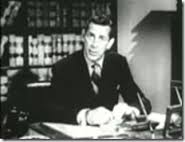TV Review: Public Defender
“If you cannot afford an attorney, one will be appointed for you.” The office of the Public Defender is a special government department that specializes in handling the cases of indigent defendants. The first such office was opened in Los Angeles in about 1914.
This series, which aired in 1954-55, was intended to raise awareness of the work of public defenders, who at the time were relatively few in number and were primarily used for cases where the death penalty was possible. The stories were purportedly based on actual cases, but several of the episodes just say that all the characters are fictional. Reed Hadley played Public Defender Bart Matthews, who narrated each episode, but was not always the focus character. Each episode ends with a tribute to a real life public defender
I watched four episodes on DVD.
- “Badge of Honor” We open at the funeral of a police officer. Mr. Matthews recalls the decedent, a rookie cop who makes a mistake during an arrest, then tries to cover it up with a falsified arrest report. His conscience bothers him, and he confesses to Mr. Matthews, who must find a way to see justice is done, but not cost the policeman his job. At the end, we find out that the cop died a hero years later, having served with honor since that one mistake.
- “Let Justice Be Done” The focus this time is on a deputy public defender who must defend a cop-killer. But not just any cop-killer, but the one who killed his best friend. In real life, the attorney would be allowed/expected to recuse himself due to this conflict of interest. But for the sake of the story, Mr. Matthews deliberately assigns him the case as some sort of lesson in justice.
- “Eight Out of One Hundred” A young Polish immigrant is accused of stealing jewelry from her mother’s employer. Mr. Matthews’ investigation is hindered by the police department being sore at him for giving a speech in which he pointed out that his office gets acquittals for about eight percent of their clients. This case is one of those eight, as the employer was hitting on the woman, and she refused him. He was also engaged in wage theft, supposedly paying the mother a living wage, but using various fees and charges to claw back 70% of it. To add insult to injury, he’s also fond of misquoting the Bible.
- “Behind Bars” It’s discovered that a woman in prison is there under an assumed name, which she used to avoid bringing trouble to her ex-husband and their daughter. A witness claimed she’d murdered her landlady in a fit of alcoholic rage. When the defender tracks down the ex, he reveals that the woman was not a violent drunk, but an extremely timid one. It’s soon discovered that there were other important details that hadn’t come out at the trial, such as that the landlady was already dying, and the witness had a grudge, as he’d tried to force himself on the defendant.
The writing is decent, but too earnest for modern tastes; the scripts do backflips to avoid criticizing the police or the justice system. I enjoyed “Eight Out of One Hundred” the best. Be aware that 1950s attitudes are rife in this show, from the frequent smoking to the expected gender roles.


